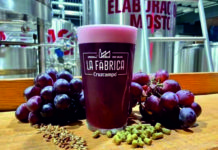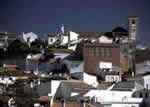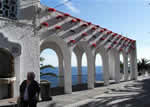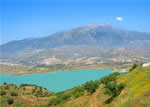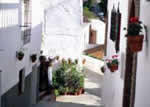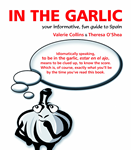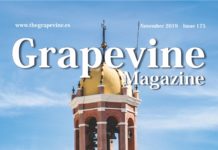
Extracts from the best selling book "In the Garlic" by Valerie Collins and Theresa O'Shea Stay a while in Spain, and beyond the sunshine, fiestas, Rioja and laidbackness you may find yourself drifting in an uncharted ocean of unwritten laws, linguistic minefields and mysterious quirks. You need to be In the Garlic – en el ajo – in the know.
Jaleo (gghhaLAYo) Din, uproar, muddle, row. An essential part of Spanish life.
Kilo Apart from meaning 1000 grams, un kilo is still used to mean one million pesetas (6000 euros). We're used to handling everyday stuff in euros, but the really huge amounts are still not truly meaningful to many people — unless we're involved in football signings or major embezzlements on a daily basis. So we still tend to use el kilo as our point of reference. “250,000 euros for a dark, one-bedroom, no-lift hole in a back alley? That's over 40 KILOS! Whatever is the world coming to!”
Lepe So there's this guy from Lepe sitting in the village square throwing watches on the ground. Another guy from Lepe comes up and asks him what he's doing, and the first man says: “Killing time.” Every country has jokes that portray people from a particular region as being seriously stupid — Spain has Lepe. We have to admit that we didn't realise until we did the research for this book that Lepe was a real place. But yes, it's a town in the province of Huelva, 41 kilometres from Huelva city, and in addition to the jokes, is Spain's strawberry capital. So anyway, one day three men, from Catalonia, Madrid and Lepe, are put through the lie detector. The Catalan says: “I think we Catalans aren't as mean as we're made out to be.” The machine bleeps. The Madrid fellow says “I think we madrileños aren't as cocky as people make out.” The machine bleeps. The guy from Lepe says “I think…” The machine bleeps.
Madrugada Considering that the Spanish are so fond of partying until the early hours, it is only right that they have a special word to describe them: la madrugada. “Son las tres de la madrugada” means it's three o'clock in the morning. Just to confuse things, madrugada also means daybreak and the verb, madrugar, means to get up at the crack of dawn. As in the children's goodnight ditty: “Vamos a la cama, que hay que descansar, para que mañana podamos madrugar. (Let's go to bed, we have to rest, so that tomorrow we can rise, bright and early).”
Moro Like the English “Moor”, moro comes from the Latin “maurus”, and was the name given to the inhabitants of Mauritania. When the Muslims invaded the Iberian Peninsula in the eighth century, the moros were just one part of the occupying forces, but gradually the term came to mean Muslims in general. Other than in a historical context, moro carries negative connotations and, like sudaca (South American) is best avoided.
Municipio The smallest administrative divisions of Spain, and the ones closest to the people, are the municipios (municipalities). Spain has 8108 municipios, according to the 2001 census. They are governed by elected municipal councils (ayuntamientos) and have executive powers for services such as transport, social services, sanitation and traffic. Their responsibilities vary according to the size of their populations. A municipio may be a village, town or city, or a country district.
In the Garlic: Your Informative, Fun Guide to Spain is published by Santana and is available at all good book shops (ISBN 13:978-84-89954-59-5)
©Valerie Collins and Theresa O'Shea 2008






